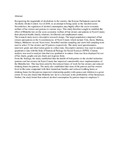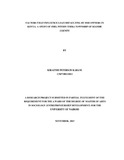| dc.contributor.author | Khaemba, Isaiah Sifuna | |
| dc.date.accessioned | 2013-11-26T14:48:47Z | |
| dc.date.available | 2013-11-26T14:48:47Z | |
| dc.date.issued | 2013 | |
| dc.identifier.citation | A Research Paper submitted to School of Economics, University of Nairobi in partial fulfillment of the requirements for award of Masters of Economics and Policy Management | en |
| dc.identifier.uri | http://hdl.handle.net/11295/60556 | |
| dc.description.abstract | Kenya’s economy has for a long time relied on rain-fed agriculture which is however possible on
arable land which constitutes only 20% of land cover, the remaining 80% being semi-arid in
nature. There are several rivers that pass through semi-arid regions which are not utilized in
irrigation purposes. Majority of farmers in semi-arid region are poor and cannot be in a position
to start irrigation without assistance from government and other credit institutions. Farmers need
money to purchase farm inputs, pay workers and other farm operational cost. The money could
easily be obtained on credit from institutional credit. This paper analyzes the effect of
institutional credit to farmers in irrigated areas on expansion of agricultural production output
with specific reference to Bura Irrigation and Settlement Project (BISP) using cross sectional
data collected from 70 farmers using questionnaire survey. The results of the study indicate that
credit, improves production capacity among maize farmers while increased labor and other
inputs utilization leads to reduced production capacity among the farmers. At the same time the
findings suggest that increasing input combinations reduces the output levels, hence, decreasing
returns to scale among the maize farmers. | en |
| dc.language.iso | en | en |
| dc.publisher | University of Nairobi | en |
| dc.title | Recognizing the magnitude of alcoholism in the country, the Kenyan Parliament enacted the Alcoholic Drinks Control Act of 2010, in an attempt to bring sanity in the Alcohol sector. Nevertheless, the regulation of alcohol consumption may highly affect the socio-economic welfare of bar owners and patrons in various ways. This study therefore sought to establish the effect of Mututho law on the socio-economic welfare of bar owners and patrons in Nyeri County their physical health; family relations; livelihoods and employment status. The research study used a descriptive research design. The target population comprised of bar owners and patrons in the 6 constituencies of Nyeri County which include Tetu, Kieni, Mathira, Othaya, Mukurwe-ini and Nyeri town. Stratified random sampling and snow ball sampling were used to select 31 bar owners and 93 patrons respectively. The study used questionnaires, interview guide and observation guide to collect data. Descriptive statistics was used to analyze quantitative data with the help of Statistical Package for Social Sciences (SPSS). Content analysis was used to analyze data that was qualitative in nature. Data was then displayed by use of bar charts, graphs and pie charts and in prose-form. From the findings, the study established that the health of both parties in the alcohol industries (patrons and bar owners) in Nyeri County has improved considerably since implementation of the Mututho law. This has been aided by the reduced hours of work for bar owners and reduced drinking hours for patrons. The study also established that most of the patrons and bar owners lived in the same compound with their immediate families and reduced working hours or drinking hours for the patrons improved relationship quality with spouse and children to a great extent. It was also found that Mututho law led to a decrease in the profitability of bar businesses. Further, the study found that reduced alcohol consumption by patrons improve employee’s xii | en |
| dc.type | Thesis | en |
| local.publisher | School of Economics | en |




